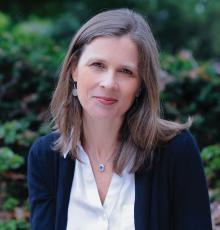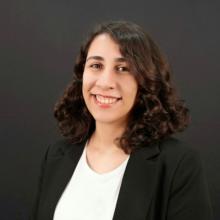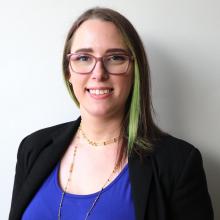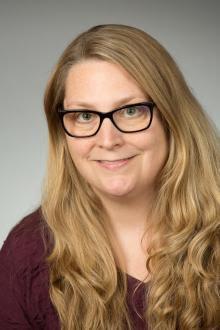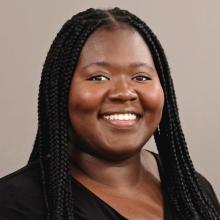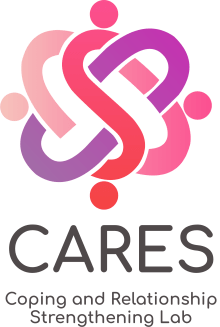
The Coping and Relationship Strengthening (CARES) Research Lab is affiliated with the Department of Family Science at the University of Maryland and the TOGETHER Program. Our work in the lab focuses on identifying factors that genuinely strengthen relationships while also recognizing relationships as sources of resilience and protection against chronic and external stressors. A core aspect of our research is our commitment to understudied and underserved communities. We take a culturally responsive approach, considering structural inequities and community-specific dynamics to understand what works best for each population.
Email: marianak@umd.edu
Phone: (301) 405-4004
Room: SPH | Room 1142
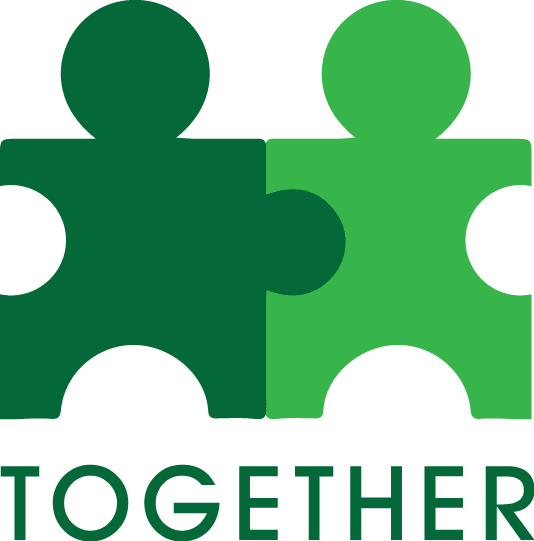 This project evaluates the effectiveness of the TOGETHER program, an evidence-based relationship and financial education program developed by Dr. Mariana Falconier and Dr. Jihnhee Kim to improve couples’ communication, reduce financial stress, and enhance relationship functioning and financial management.
This project evaluates the effectiveness of the TOGETHER program, an evidence-based relationship and financial education program developed by Dr. Mariana Falconier and Dr. Jihnhee Kim to improve couples’ communication, reduce financial stress, and enhance relationship functioning and financial management.
Funding: Healthy Marriage and Responsible Fatherhood (HMRF) Grant by the Administration for Children and Families (ACF)
Publications:
- Falconier, M. K., Foss, R., Lachowicz, M. J., & Kim, J. (2023). Evaluation of the 14‐h together relationship and financial education program for couples. Personal Relationships, 30(2), 660-680. https://doi.org/10.1111/pere.12466
- Falconier, M. K., Kim, J., & Lachowicz, M. J. (2023). Together–A couples’ program integrating relationship and financial education: A randomized controlled trial. Journal of Social and Personal Relationships, 40(1), 333-359. https://doi.org/10.1177/02654075221118816
- Falconier M.K. (2015). Together – A couples’ program to improve communication, coping, and financial management skills: Development and initial pilot-testing. Journal of Marital and Family Therapy, 41(2), 236–250. https://doi.org/10.1111/jmft.12052
 This project examines the effectiveness of adapting the TOGETHER program to an online delivery format. The adaptation aims to enhance accessibility, particularly for couples in rural or underserved areas, and to overcome common participation barriers. By maintaining the program’s evidence-based core components, the online format seeks to deliver the same positive outcomes in psychological well-being, relationship functioning, and financial management as the in-person version.
This project examines the effectiveness of adapting the TOGETHER program to an online delivery format. The adaptation aims to enhance accessibility, particularly for couples in rural or underserved areas, and to overcome common participation barriers. By maintaining the program’s evidence-based core components, the online format seeks to deliver the same positive outcomes in psychological well-being, relationship functioning, and financial management as the in-person version.
Funding: Healthy Marriage and Responsible Fatherhood (HMRF) Grant by the Administration for Children and Families (ACF)
Publications:
- Azizi, Z., Falconier, M. K., & Lachowicz, M. J. (in print). Evaluation of the online TOGETHER relationship and financial education program for couples. Family Relations.
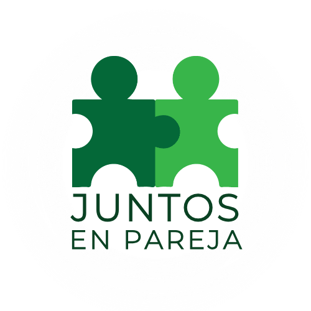 This project evaluates the effectiveness of Juntos en Pareja, a culturally and linguistically tailored adaptation of the TOGETHER program designed specifically for Latine couples. The program addresses the unique financial needs and challenges faced by Latine immigrants, incorporating topics such as managing multigenerational households, sending remittances to countries of origin, and navigating other financial aspects specific to Latine households. By integrating these culturally relevant topics into the curriculum, Juntos en Pareja aims to enhance financial well-being, improve relationship dynamics, and promote long-term resilience among Latine couples.
This project evaluates the effectiveness of Juntos en Pareja, a culturally and linguistically tailored adaptation of the TOGETHER program designed specifically for Latine couples. The program addresses the unique financial needs and challenges faced by Latine immigrants, incorporating topics such as managing multigenerational households, sending remittances to countries of origin, and navigating other financial aspects specific to Latine households. By integrating these culturally relevant topics into the curriculum, Juntos en Pareja aims to enhance financial well-being, improve relationship dynamics, and promote long-term resilience among Latine couples.
Funding: Healthy Marriage and Responsible Fatherhood (HMRF) Grant by the Administration for Children and Families (ACF)
Publications:
- Yumiseva, M., Falconier, M., & Azizi, Z. (2025). Pilot test of JUNTOS EN PAREJA: Enhancing relationship and financial well‐being in Latine couples. Journal of Marital and Family Therapy, 51(1), e12752. https://doi.org/10.1111/jmft.12752
-
Falconier, M., Williamson, H., Azizi, Z., & Yumiseva, M. (under review). Evaluation of the Individual, Relationship, and Financial Benefits of JUNTOS EN PAREJA for Latine Spanish-Speaking Couples. Family Process.
 This project evaluates the implementation and effectiveness of TOGETHER LGBTQ+ Adaptation, a culturally tailored adaptation of the TOGETHER Program for LGBTQ+ couples. The adaptation maintains TOGETHER’s evidence-based core components while centering the experiences and needs of LGBTQ+ people. The adaptation incorporates specific stress and financial stress concerns like coping with minority stress and discrimination, connecting with community and chosen family, financing gender affirming care and LGBTQ+ family planning, and improving communication skills and co-regulation with the aim of supporting LGBTQ+ couples’ long-term health and success.
This project evaluates the implementation and effectiveness of TOGETHER LGBTQ+ Adaptation, a culturally tailored adaptation of the TOGETHER Program for LGBTQ+ couples. The adaptation maintains TOGETHER’s evidence-based core components while centering the experiences and needs of LGBTQ+ people. The adaptation incorporates specific stress and financial stress concerns like coping with minority stress and discrimination, connecting with community and chosen family, financing gender affirming care and LGBTQ+ family planning, and improving communication skills and co-regulation with the aim of supporting LGBTQ+ couples’ long-term health and success.
Funding: Healthy Marriage and Responsible Fatherhood (HMRF) Grant by the Administration for Children and Families (ACF)
 Using semi-structured individual interviews, the Emotional Map of the Home project seeks to understand how heterosexual African American couples construct a sense of security in their homes and what emotional and environmental strategies they use to cope with stress.
Using semi-structured individual interviews, the Emotional Map of the Home project seeks to understand how heterosexual African American couples construct a sense of security in their homes and what emotional and environmental strategies they use to cope with stress.
Funding: University of Maryland, College Park
Mariana Falconier (she/her)
Professor, Family Science
Director, Couple and Family Therapy Master's Program
Dr. Mariana Falconier is Director of the Couple and Family Therapy Master’s program at the University of Maryland. She completed her master’s degree in Marriage and Family Therapy and her doctoral degree in Family Studies at the University of Maryland. Previously, Dr. Falconier was an associate professor at the Virginia Tech MFT master’s program. She is a licensed marriage and family therapist in Maryland and Virginia and AAMFT approved supervisor. She has been seeing individuals, couples, and families since 1992, especially immigrant and Latine communities. and Her research focuses on how couples cope with chronic stress, particularly economic, immigration, medical, and minority stress in low-income, Black, Latine, and LGBTQ+ relationships. She developed TOGETHER, a couples’ program integrating relationship and financial education and federally funded for over $11 million and culturally adapted for Latine immigrant couples and for LGBTQ+ relationships. She has taught several courses in the department, including FMSC 745 Gender and Ethnicity Issues in Family Service Delivery, FMSC 641 Couple Therapy, and FMSC 658 Supervised Clinical Practice of Marriage and Family Therapy.
Lab Coordinator
Zeinab (Sarah) Azizi (she/her)
Sarah (Zeinab) Azizi is a doctoral candidate in Family Science at the University of Maryland’s School of Public Health. Her research focuses on the effect of stress on couple relationships, particularly among couples managing chronic diseases. She is also deeply interested in developing and evaluating relationship education interventions tailored to couples facing chronic health challenges. Sarah works as a research assistant with Dr. Mariana Falconier in the TOGETHER program, where she oversees data collection, manages data, and evaluates the program’s effectiveness. Her previous work includes adapting and pilot-testing a psychoeducational program for Iranian couples coping with cardiovascular disease. Sarah holds a bachelor’s degree in Counseling and a master’s degree in Family Counseling from the University of Tehran. Her strong academic foundation, combined with clinical training in Emotionally Focused Therapy, informs her research and practice, emphasizing the importance of emotional connection in promoting health and well-being in couples.
Contact: znbazizi@umd.edu
Graduate Students
SD Murry (they/them)
SD Murry is a doctoral student in Family Science whose research focuses on mental health and substance use disorder treatment design, implementation, and evaluation for LGBTQIA+ people, especially for those with gender minority identities. SD is partnering with Dr. Mariana Falconier on the TOGETHER Program as a Research Assistant and works with Dr. Jessica Fish's Sexual Orientation Gender Identity Health Lab. Before beginning their doctoral studies, they worked as a licensed social worker for over 9 years, providing outpatient mental health treatment and substance use disorder treatment. SD is currently offering telehealth therapy to LGBTQIA+ community members with Chesapeake Behavioral Health, LLC, and is a board-certified supervisor for both mental health and substance use disorders. SD holds an A.A.S. in Human Services from Anne Arundel Community College, a B.S. in Social Work from UMBC, and an M.S. in Social Work from the University of Maryland, Baltimore.
Contact: smurry1@umd.edu
Rebecca Foss (she/her)
Rebecca Foss is a Family Science doctoral candidate, whose research focuses on mental health and innovative communication and dissemination methods, particularly in the use of online interventions, social media, and transmedia storytelling. Rebecca has nearly two decades of experience in marketing and communications resulting in a working knowledge of multiple media executions and communication delivery methods. She aims to draw from her past experience and present research to transform public health communication using mixed-media methods based on what resonates most with specific populations. Rebecca has been involved in multiple capacities with the TOGETHER Program at UMD, including marketing and recruitment, research, data management, and case management.
Chidinma (Chichi) Nwankwo (she/her)
Chichi is a doctoral student in Family Science at the University of Maryland, College Park. Her research explores how social and structural factors influence the health and well-being of racial and ethnic minority families, with a particular focus on the resilience of Black immigrant families. Chichi began her career as an early childhood educator for children ages 0–5, then pursued graduate studies in Maternal and Child Health. Her work since then has helped her understand the many factors that shape family health and well-being. Chichi also works part-time as an Advisory Services Analyst for Mathematica, where she provides programmatic support to several human service agencies. Chichi holds a B.S. in Psychology from Carnegie Mellon University and an M.P.H in Maternal and Child Health from George Washington University. Outside of work, Chichi enjoys going on long walks, exploring new restaurants and coffee shops, and spending time with friends and family.
Heidi Huang (she/they)
Xu “Heidi” Huang (she/they) is a current master's student in the Couple and Family Therapy program at University of Maryland, College Park. Heidi’s main research interest is accessible therapy-informed educational programs, including relationship education programs like TOGETHER that serve diverse communities. With a PhD in Neurobiology and Behavior, Heidi also aspires to bridge research in neuroscience and therapy and develop neuro-education programs for practitioners. Outside of work, Heidi enjoys hanging out with friends and trying out new experiences.
Helen Romero (she/her)
Helen Romero (she/her) is a graduate student in the Couple and Family Therapy program at the University of Maryland, College Park. She hopes to work toward expanding access to mental health resources for minority communities, with an emphasis on culturally informed care. Through her work with the TOGETHER Program in marketing, data analysis, and workshop facilitation, Helen helps deliver relationship education that supports healthy partnerships in both English- and Spanish-speaking communities.
Undergraduate Students
Miriam Alinee Hernandez (she/her)
Miriam Hernandez is a bachelor’s student in the Information Science program at the University of Maryland, College Park. As an intern with the TOGETHER Program, she supports the adaptation of TOGETHER for Latine couples, combining her passion for community engagement with her academic focus on information management. Originally from Silver Spring, Maryland, Miriam earned her A.A. in General Studies – STEM from Montgomery College before transferring to UMD. In her free time, she enjoys various creative hobbies, watching movies, and spending time with family and friends. She hopes to continue studying data management and organization to help develop insights and help the organization achieve its goals.
CARES Lab Affiliates
Martha Yumiseva, PhD, Adjunct Professor, University of Maryland College Park
Alexandra Wojda-Burlij, PhD, Postdoctoral Research Fellow in Mental Illness Research & Treatment
Jessica Fish, PhD, Professor, Human Development and Family Studies, University of Illinois Urbana-Champaign
Jinhee Kim, PhD, Associate Dean, Extension, University of Maryland College Park
Norman Epstein, PhD, Emeritus Professor, Department of Family Science, University of Maryland College Park
Rabiatu Barrie, PhD, Assistant Professor, Department of Family Science, University of Maryland College Park
International CARES Lab Affiliates
Dr. Diana Rivera, Faculty, School of Psychology, Pontificia Universidad Católica de Chile, Santiago de Chile, Chile
Dr. Gertrud Stadler, Professor, Institute Gender in Medicine Director, Charité - Universitätsmedizin Berlin, Germany
Nancy Yu, PhD, Associate Professor, Department of Social and Behavioural Sciences, City University of Hong Kong, Hong Kong.
Tamas Martos, PhD, Professor and Chair, Institute of Psychology, University of Szeged, Hungary.
Viola Sallay, PhD, Professor, Sigmund Freud Private University, Paris, France, and Associate Professor, Institute of Psychology, University of Szeged, Hungary.
* Graduate Student
- *Berman, Z. L., Mittal, M., Falconier, M. K., & Fish, J. N. (2025). Are we ready to serve? Couple and family therapists’ attitudes toward BDSM and their perceived competence to help BDSM practitioners. Sexual and Relationship Therapy, 1-23. https://doi.org/10.1080/14681994.2025.2507105
- Hou, J., Falconier, M. K., Tam, W., Cheung, M. W. L., Fu, R., Bu, H., & Yu, N. X. (2025). Dyadic coping and relationship satisfaction among couples with a chronic illness: A meta-analytical actor–partner interdependence model. Clinical Psychology Review, 102587. https://doi.org/10.1016/j.cpr.2025.102587
- *Yumiseva, M., Falconier, M., & *Azizi, Z. (2025). Pilot test of JUNTOS EN PAREJA: Enhancing relationship and financial well‐being in Latine couples. Journal of Marital and Family Therapy, 51(1), e12752. https://doi.org/10.1111/jmft.12752
- Falconier, M. K., Wojda-Burlij, A. K., & Conway, C. A. (2024). Dyadic coping moderates the association between economic strain and psychological distress in low-income couples. International Journal of Stress Management. https://doi.org/10.1037/str0000338
- Conway, C. A., Falconier, M. K., & Kim, J. (2024). The relationships among parents’ anxious and avoidant attachment, emotion dysregulation, and parenting. Contemporary Family Therapy, 46(3), 294-311. https://doi.org/10.1007/s10591-023-09681-w
- Falconier, M. K., *Foss, R., Lachowicz, M. J., & Kim, J. (2023). Evaluation of the 14‐h together relationship and financial education program for couples. Personal Relationships, 30(2), 660-680. https://doi.org/10.1111/pere.12466
- Kim, J., Falconier, M. K., & Conway, C. A. (2023). Relationships among emotion regulation, financial self-efficacy, and financial management behaviors of couples. Journal of Family and Economic Issues, 44(2), 342-355. https://doi.org/10.1007/s10834-022-09827-2
- Falconier, M. K., Wojda‐Burlij, A. K., Conway, C. A., & Kim, J. (2023). The role of emotion regulation in couples’ stress communication and dyadic coping responses. Stress and Health, 39(2), 309-322. https://doi.org/10.1002/smi.3186
- Randall, A. K., Donato, S., Neff, L. A., Totenhagen, C. J., Bodenmann, G., & Falconier, M. (2023). A scoping review on couples’ stress and coping literature: Recognizing the need for inclusivity. Journal of Social and Personal Relationships, 40(3), 812-855. https://doi.org/10.1177/02654075221101904
- Falconier, M. K., Kim, J., & Lachowicz, M. J. (2023). Together–A couples’ program integrating relationship and financial education: A randomized controlled trial. Journal of Social and Personal Relationships, 40(1), 333-359. https://doi.org/10.1177/02654075221118816
- Falconier, M. K., & Jackson, J. B. (2020). Economic strain and couple relationship functioning: A meta-analysis. International Journal of Stress Management, 27(4), 311.
- Falconier, M. K., Rusu, P. P., & Bodenmann, G. (2019). Initial validation of the dyadic coping inventory for financial stress. Stress and Health, 35(4), 367-381. https://doi.org/10.1002/smi.2862
- Bodenmann, G., Falconier, M. K., & Randall, A. K. (2019). Dyadic coping. Frontiers in Psychology, 10, 1498. https://doi.org/10.3389/fpsyg.2019.01498
- Escobar, J., Falconier, M., & Muruthi, B. (2019). ‘Se llevaron el padre de mis hijos’: Latina mothers coping with the deportation of their partner. Journal of family therapy, 41(2), 277-301. https://doi.org/10.1111/1467-6427.12227
- Falconier, M. K., & Kuhn, R. (2019). Dyadic coping in couples: A conceptual integration and a review of the empirical literature. Frontiers in Psychology, 10, 571. https://doi.org/10.3389/fpsyg.2019.00571
Books and Book Chapters
- Epstein, N. B., & Falconier, M. K. (2024). Treatment Plans and Interventions in Couple Therapy. Guilford Publications.
- Falconier, M. K., & Epstein, N. B. (2019). Contingency Contracting in Couple and Family Therapy. In Encyclopedia of Couple and Family Therapy (pp. 583-585). Cham: Springer International Publishing.
- Epstein, N. B., & Falconier, M. K. (2018). Communication training in couple and family therapy. In Encyclopedia of Couple and Family Therapy (pp. 1-3). Springer, Cham.
- Epstein, N. B., & Falconier, M. K. (2017). Shame in couple relationships. In Foundations for Couples' Therapy (pp. 374-383). Routledge.
- Bodenmann, G., Randall, A. K., & Falconier, M. K. (2016). Coping in couples: the systemic transactional model (STM). In Couples coping with stress (pp. 5-22). Routledge.
- Falconier, M. K., Randall, A. K., & Bodenmann, G. (Eds.). (2016). Couples coping with stress: A cross-cultural perspective. Routledge.
- Falconier, M. K. (2016). Dyadic Coping in Latino Couples in the US. In Couples Coping with Stress (pp. 70-85). Routledge.
- Falconier, M. K., Randall, A. K., & Bodenmann, G. (2016). Cultural considerations in understanding dyadic coping across cultures. In Couples Coping with Stress (pp. 23-35). Routledge.
- Epstein, N. B., & Falconier, M. K. (2014). Cognitive-behavioral therapies for couples and families. In An introduction to marriage and family therapy (pp. 259-318). Routledge.
Graduate and undergraduate students interested in exploring stress and coping in relationships are encouraged to join the CARES lab. We offer both volunteer and credit-based research assistantship opportunities. To express your interest in joining, please complete this form.
Prospective graduate students interested in collaborating with CARES Lab are encouraged to reach out at marianak@umd.edu.
